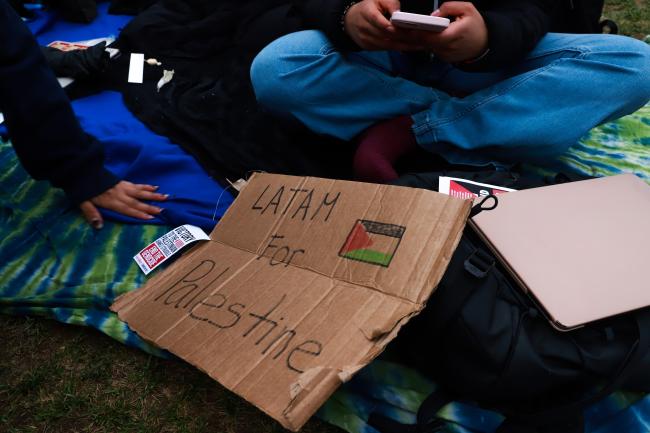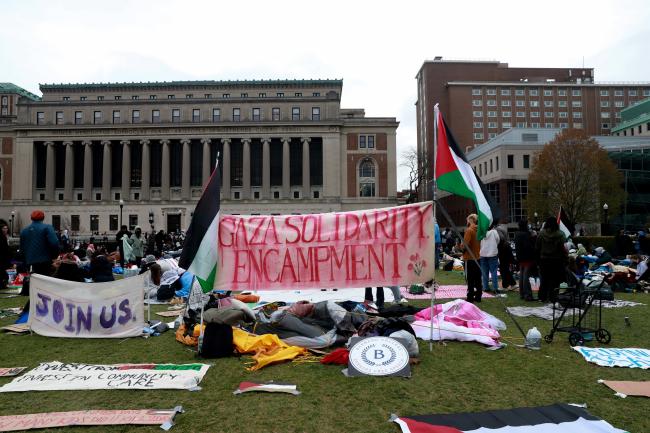
Leer este artículo en español.
This article was originally published by Ojalá on May 2.
Until it was dismantled by police, the tension at the encampment at Columbia University was relieved by the sounds of students moving in unison and chanting “Free, Free Palestine.”
The protest camp, which had been set up twelve days earlier, was violently destroyed late into the night on Tuesday, April 30. Police arrested 108 students on the first day of the encampment and another 109, including professors and community members, on April 30.
The second round of arrests has not deterred the students, who have surrounded campus entrances, which are now closed and blocked by police.
Seven months of Israeli attacks against the Palestinian people and decades of occupation inspired the protest and moved students across the United States and beyond to set up their own camps demanding a ceasefire.
What began at Columbia University in New York in mid-April spread like a prairie fire to more than 100 U.S. universities. Protesters have also set up camps in France, Turkey, Canada, Australia and at the Autonomous National University in Mexico City. I visited the camp before it was dismantled in order to get a sense of what students from Latin America or of Latinx descent had to say about the protest.
"We have classes, we have projects and we’re working to pay for our education," said JQ, a Columbia student whose parents are from Ecuador and who asked to remain anonymous.* “But we’re here. We know that we can always redo an exam, but that once lost, Palestinian lives and communities cannot be brought back.”
During the encampment, organizers set up speakers and microphones near the entrance to Columbia University's West Lawn. Activists used them to lead chants and discuss various issues. Professors used them to give workshops.
The workshops focused on events in Gaza as well as on their intersection with resistance movements in the Global South, such as the Zapatistas, and that those occur in peripheries in the “first world,” including those led by Puerto Ricans, Dominicans, Hondurans, and Mexicans living in the Bronx.
"The same people who build walls between the United States and Mexico build walls in Palestine," said HL, a Columbia student with Mexican parents. For her, supporting the Palestinian people reflects a broad commitment to liberation.
Israel has a large military industry made up of companies that manufacture and export weapons and military technology, fueling armed conflicts in other countries.
Elta North America, an Israeli arms manufacturer, was one of four companies selected to build a prototype of the U.S.-Mexico border wall. The southern U.S. border has served as a testing ground for Israeli surveillance systems. Several Latin American governments have used Israeli-made Pegasus software to spy on human rights activists and journalists, according to the United Nations.
"As a Mexican born in the United States, I understand the suffering and anger that these oppressive systems cause our people and how they take our land," said AI, a student of Mexican parents in an interview on the West Lawn before the encampment was taken down. “The revolution will not stop; people from around the world will unite, from Palestine to the Congo, from Sudan to Mexico.”
Katherine, a student whose parents are from Honduras, is passionate about the struggle of Palestinian women. "My feminism includes all women," she said. "Not just gringa women, as white feminism tends to be, but women of all classes and colors.”
A commitment to international solidarity and collective resistance was deeply rooted in the encampment. Professors supported their students by forming human chains to protect the tents during police attempts to enter. Even though the camp was raided by police, students continue to demand that Columbia cancel its investments in Israel and an immediate ceasefire in Gaza.
"It's important that people all over the world see what’s happening," Katherine told me in an interview on April 19. “We need people to understand that the only way to resist oppression is through community, by taking care of each other, and fighting back together."

The Evolution of a Revolt
A coalition of more than 120 student groups, including Columbia University Apartheid Divest and local chapters of organizations like Students for Justice in Palestine and Jewish Voice for Peace, organized the actions at Columbia.
On April 18, Columbia President Minouche Shafik called upon the police to clear the campus, leading to the arrest of 108 protesters. This sparked widespread outrage and prompted students at other universities in New York City to set up their own pro-Palestinian encampments. Shafik again called on the police to intervene on April 30 after students occupied the Hamilton Hall building, claiming safety threats in a communiqué.
Students are demanding their universities divest from companies that arm Israel or support its weapons industry. They also insist that scientific, technological, and medical research is not used in this genocide or in future armed conflicts.
Divestment may sound utopian, but it can be achieved.
On April 17, the University of York in England announced that it would completely divest from arms and ammunition manufacturers after prolonged protests by students. In Rhode Island, Brown University announced it will consider divesting from Israeli companies involved in the occupation of Palestine.
Minouche affirmed in a statement that Columbia will not divest from companies implicated in Israel's military efforts in Gaza. Student anger at the repression of their movement, the raid of the encampment, and the ongoing genocide in Gaza is growing.
Latinx Students for Palestine
After the camp at Columbia began, authorities shut down campus and professors moved to online classes. Access to the campus had been relatively open, but authorities restricted and eventually closed entrances in response to increasing direct actions by protesters.
On April 19, I snuck through a back gate with the help of other colleagues. The students were gathered in a corner of the West Lawn garden.
On the grass, next to piles of blankets, tents, and half-eaten pizzas there were board games, granola bars, banana peels, and potato chip wrappers. Between chanting, praying, and workshops, the students read, chatted together, and worked on their computers.
Only eight percent of students at Columbia, a prestigious private university, are Latinx. But between chants of “Disclose! Divest! We will not stop, we will not rest!” I heard someone speaking Spanish. My ears perked up.
I found two students wearing Keffiyehs and black surgical masks sitting with a cardboard sign that read “Latam for Gaza.”
The students, initials AI and JQ, introduced me to others with parents who had migrated from Latin America. Driven and motivated, these students are mostly freshmen and sophomores; not one of them was more than 20 years old. Although I couldn’t see their full faces, their black eyeliner and determined gazes conveyed their commitment to a cause that crosses borders.
Not all of them were staying overnight. Some of their parents know of their participation in the camp and support the cause, but tell them that they have to weigh the risks of arrest, a criminal record, and suspension from the university.
"We don't have the same privileges as students who come from families with more resources," said JQ. If they are arrested, it is more complicated for their families to get them out of jail and it is difficult to clear a criminal record so they can get jobs later.
AI told me her family has questioned her involvement in these protests. Her parents risked a lot when they came from Mexico, where they left their lives in search of something better. The possibility that their daughter might be arrested in a pro-Palestinian protest or suspended from college was not part of the plan.
Other parents are unaware that their children are hanging out at the encampment. Although they say that it’s important for their communities to be informed about what is happening in and outside of New York, AI says that it is difficult for them to join demonstrations for Palestine.
"People who have to work all the time to make ends meet don't have time for anything else," said AI.
Arrests and Police Brutality
“I cried when they arrested my friends,” said HL. “We were all shouting at the police, ‘Please don’t!’”
Following the first wave of arrests at the Columbia encampment, and university administrators’ total refusal to meet protesters’ demands, more people joined in.
In addition to the over 200 arrests at Columbia, police arrested more than 100 pro-Palestinian protesters at New York University on April 22 and 15 students at Fordham University’s Manhattan campus on May 1.
At the City College of the City University of New York, students managed to keep police out of the encampment by forming a human chain, pushing blue uniforms off campus. On April 30, police brutally arrested 179 protesters outside of the campus, using tear gas and excessive force.
Police have arrested students and teachers across the United States. Over a 1900 students have been arrested or detained to date, often in a violent manner, and arrests and evictions are ongoing. After being booked and released, some of the students have been suspended and others expelled.
Regardless of the repression, more universities continue to join the protests in solidarity with Gaza.
*At the request of the students involved in the protests, some of whom have family members without legal status in the United States, we have kept their names anonymous.
Mariana Navarrete Villegas is a Mexican journalist who has covered stories related to social justice, migration, politics and culture. She’s worked for media in Florida, California, New York, and Mexico. She’s currently a master’s student at the bilingual journalism program of CUNY, a freelance reporter, and helps run the community media Molino Informativo in New York City.

